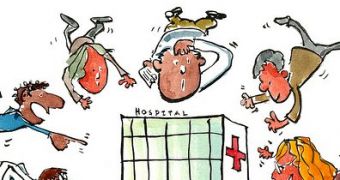A national audit of the treatment of heart failure, showed that patients admitted to general ward were twice as likely to die as those admitted to cardiology wards.
Furthermore, women underwent less appropriate investigations and treatment than men, although it seems that death rates were similar.
The researchers based their conclusions on a survey including the first 10 patients admitted every month, between April 2008 and March 2009, in 86 hospitals across England and Wales, with a primary diagnosis of heart failure.
During these 12 months, more than 6,000 patients, with an average age of 78 years, were admitted with the condition, and almost half of them (43%) were women.
According to survey data, at admission, 30% of the patients were reported to be breathless at rest and 43% had swollen feet/ankles – both symptoms being signs of heart failure.
The authors say that appropriate investigations were not always carried out, with people admitted to general medical wards less likely to receive them than those admitted to cardiology wards.
Even though most patients received a heart trace monitor test (echocardiogram), only 65% of those admitted to general medical ward underwent the test.
The echocardiogram showed that the left ventricular ejection fraction (LVEF), which reveals the pump action of one of the two lower chambers of the heart, was 40% or less in most of those admitted.
The concern is that LVEF was not recorded in one of four patients, and most of those who had an LVEF under 40% or those whose LVEF was not recorded, were more likely to be women, older, and admitted in general medical wards.
Also, only 1% of the patients, had their levels of natriuretic peptides measured, despite National Institute of Health and Clinical Excellence recommendations – the level of natriuretic peptides is a far more effective test for heart failure and also a much better predictor of probable outcome than LVEF, the authors mentioned.
Half of the heart failure patients were admitted to cardiology wards, and according to survey data, they tended to be younger than those admitted in general medical wards, and also, more likely to be men.
Even after considering other risks, patients admitted in general medical wards were twice more likely to die as those admitted in cardiology wards.
Also, despite the appropriate medicines being prescribed to people in whom discharge drug treatment was recorded, only half were prescribed beta blockers – mostly men and younger patients.
The authors conclude that “currently, hospital provision of care is suboptimal and the outcome of patients poor.
“The same rules that apply to suspected cancer should pertain to a disease with such a malign prognosis as heart failure.”
In 2006-2007, heart failure caused over a quarter of a million hospital deaths and discharges in England and Wales, the equivalent of around 2.5 million bed days a year and an annual cost to the NHS of £563 million.
The audit was published online in the journal Heart.

 14 DAY TRIAL //
14 DAY TRIAL //